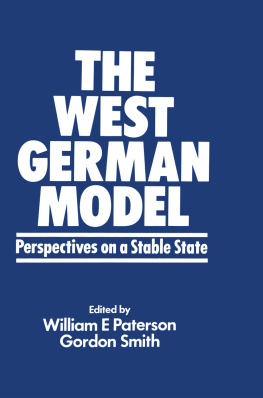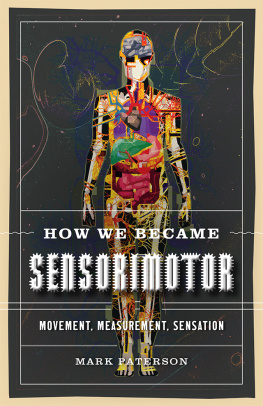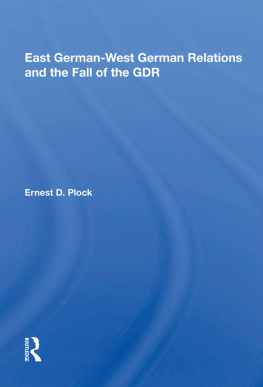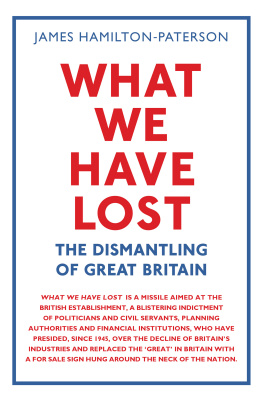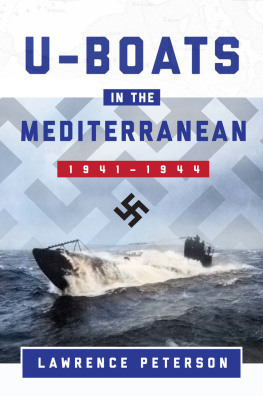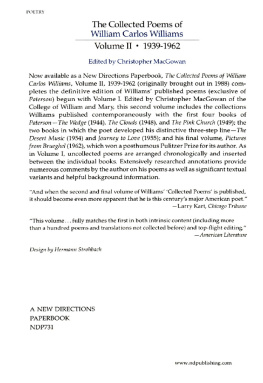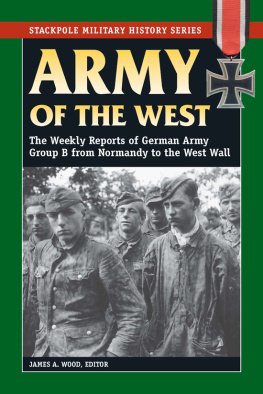First published in 1981 by Frank Cass and Company Limited
This edition published 2013 by Routledge
2 Park Square, Milton Park, Abingdon, Oxon OX14 4RN
711 Third Avenue, New York, NY 10017
Routledge is an imprint of the Taylor & Francis Group, an informa business
Copyright 1981 Frank Cass & Co. Ltd
British Library Cataloguing in Publication Data
The West German model.
1. Germany, West-History-Addresses, essays, lectures
I. Paterson, William F. II. Smith, Gordon
943.087 DD259
ISBN 0-7146-3180-9 (Case)
ISBN 0-7146-4034-4 (Paper)
This group of studies first appeared in a Special Issue on The West German Model: Perspectives on a Stable State of West European Politics, Vol.4, No.2, published by Frank Cass & Co.Ltd.
All rights reserved. No part of this publication may be reproduced, stored in a retrieval system, or transmitted in any form, or by any means, electronic, mechanical, photocopying, recording, or otherwise, without the prior permission of the publishers.
Typeset by Barron Print & Setting, Thornton Heath, Surrey
William E. Paterson is Volkswagen Senior Lecturer in German Politics, Warwick University. He is author of The SPD and European Integration (Saxon House, 1974), co-author with I. Campbell of Social Democracy in Post War Europe (Macmillan, 1974) and has co-edited Social and Political Movements in Western Europe (Croom Helm, 1976) with M. Kolinsky, Special Democratic Parties in Western Europe (Croom Helm, 1977) with A. Thomas, Foreign Policy Making in Western Europe (Saxon House, 1978) with W. Wallace and Sozialdemokratische Parteien in West Europa (Bonn, 1979) with K. Schmitz.
David P. Conradt is Professor of Political Science at the University of Florida. During the 1978/79 academic year he was a Fullbright Research Professor at the Universitt Konstanz. The German Polity (1978), The West German Party System (1972) and contributions to The Civic Culture Revisited (1980) and Germany at the Polls (1978) are among his publications.
Kenneth Dyson is lecturer in the Department of Political Theory and Institutions of the University of Liverpool. He has published The State Tradition in Western Europe and Party, State and Bureaucracy in West Germany, as well as numerous articles on West European and West German politics and public administration.
Jonathan Story is Associate Professor in the European Business Environment Department INSEAD at Fontainebleau, France, and a member of the Institut Franais des Relations Internationales, Paris. His publications include Euro-Communism: Myth or Reality? (Penguin, 1979), North Sea Oil: Its effects on Britains Economic Future (INSEAD, 1975), South Africa: The Limits of Growth (INSEAD, 1975), and chapters in Foreign Policy Attitudes of Socialist Parties in Western Europe (ed. Werner Feld, Committee on Atlantic Studies, 1977) and Social Democratic Parties in Western Europe (ed. William Paterson, Croom Helm, 1977).
Roger Morgan is Head of the European Centre for Political Studies, Policy Studies Institute, London; he is also an Associate Member of Nuffield College, Oxford, and a Visiting Professor at the University of Surrey. His publications include The German Social Democrats and the First International (1965), Britain and West Germany: Changing Societies and the Future of Foreign Policy (with Karl Kaiser) (1971), The United States and West Germany, 1945-1973 (1974), and West Germanys Foreign Policy Agenda (1978).
Helga Michalsky is Assistant Professor of Political Science at the University of Heidelberg. She is the author of Bildungspolitik und Bildungsreform in Preussen (Weinheim, Basel, Beltz Verlag 1978), and has published several articles on the economic and social policies of the two German states.
Geoffrey Pridham is Lecturer in European Politics at Bristol University. His books include Christian Democracy in Western Germany: The CDU/CSU in Government and Opposition, 1945-76 (1977), Transnational Party Cooperation and European Integration: The process towards direct elections, with Pippa Pridham (1981) and The Nature of the Italian Party System: A regional case study (1981).
Peter Pulzer has been Official Student (i.e. Tutorial Fellow) in Politics at Christ Church, Oxford since 1962. He is the author of The Rise of Political Anti-Semitism in Germany and Austria, Political Representation and Elections in Britain and numerous articles on British and German politics.
Richard J. Evans has been Lecturer in European History at the University of East Anglia, Norwich, since 1976. He is the author of The Feminist Movement in Germany 1894-1933 (1976) and other books and articles on German history. In 1980 he was Visiting Associate Professor at Columbia University in the City of New York, and he is currently a Research Fellow of the Alexander von Humboldt Foundation at the Free University of Berlin, where he is preparing a study of twentieth-century German historiography.
R. B. Tilford is Professor of Modern Languages and Chairman of the Postgraduate School of Studies in Language and European Studies, University of Bradford. He has broad interests in contemporary West German politics with, in recent years, particular interest in the governance of West German universities and the relationship between the university and the state in that country. His publications include (with R. Preece) Federal Germany. Social and Political Order (Oswald Wolff, London, 1968), (ed.) The Ostpolitik and Political Change in Germany (Saxon House, London 1975), and a number of articles on different aspects of West German politics in political science journals.
Gordon Smith is Reader in Government, London School of Economics and Political Science. He is the author of Politics in Western Europe (Heinemann, 3rd edition, 1980), Democracy in Western Germany (Heinemann, 1979) and Party Government and Political Culture in Western Germany (Macmillan, forthcoming).
Preface
In recent years the Federal Republic has become almost synonymous with the idea of political stability. Casual observers tend to regard Western Germany in a quite uncritical light as an unqualified success story, her achievements a reward for unstinting effort, her stability as the ultimate prize awarded only to the most well-behaved of liberal democracies.
There is no doubt that the Federal Republic has exerted a powerful fascination on political scientists precisely because of her stable politics, even if the motivating interest at an earlier stage was whether the absence of a basic crisis was not just a temporary phase. For whatever reason, the fortunes of the republic have been subjected to a scrutiny equally close as that given to the misfortunes of the Weimar Republic.
As a general concept, or as an expression of approbation, the concept of stability does not present too many difficulties; in a broad way it is easy enough to propound answers as to why the second republic has been so successful and why the first was not. Yet the more one studies contemporary West German politics, the more difficult it becomes to make easy generalisations: it has to be admitted that the conditions of stability are complex and elusive, and they are just as difficult to pin down as are the obverse conditions of crisis. It was with such a view of Western Germany in mind that the present collection of essays was conceived, to offer in fact a series of


